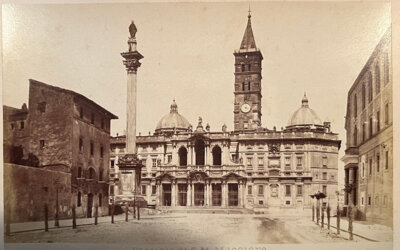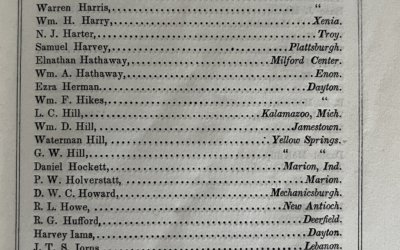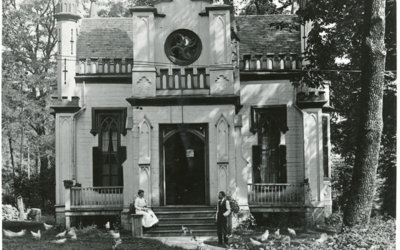From the department of Mother Knows Best comes Mary Mann, widow of Horace Mann, telling her son Horace Jr. not only what to do but how to live his life.
She complains that his last letter took nearly two months to reach her, perhaps not realizing just how far the Sandwich Islands are from Concord, MA (over 8000 miles as the crow flies, btw). For context, the First Transcontinental Railroad has only just begun construction and the Panama Canal is still decades away, lengthening the trip considerably. Rapidly developing into one of America’s premier botanists, Horace Jr. had gone to Hawaii in 1864 to survey its plant life. Accompanied by another young scientist, William Tufts Brigham, together the two scholars identified over a hundred species previously unknown to Western science. This research would become Jr.’s senior thesis at Harvard (class of 1867) and his major published work, Enumeration of Hawaiian Plants.
Always a rich source of news, Mary catches her son upon the two main stories of the day, the US Civil War and the upcoming presidential election of 1864. Ringing familiar with current events in America, she deplores the twin evils of ignorance and selfishness as the root cause of “our country’s disaster.” Although she refers to slavery, her comments readily apply to the national disaster of 2020. Also familiar to moderns is her discussion of the national election, coincidentally the one most closely compared to today on the issue of mail-in voting. One of the major parties is in disarray and can be seen as representing an old order on its last gasp. In 1864 that party was the Democrats, running on a so-called “peace platform” formed at the National Convention in Chicago to end the war and leave slavery in a place where it still existed. Despite nominating former Union Army commander George B. McClellan for president (his running mate, George Pendleton of Cincinnati, was portrayed brilliantly and hateable by Scottish actor Peter McRobbie in Steven Spielberg’s 2012 film Lincoln), the peace platform was roundly rejected by the soldiers the general had once led, who voted nearly eighty percent in favor of the Republicans and Abraham Lincoln.
Once she concludes her gazetteer, Mary gets to what she really wants to say, which is that she does not approve of her son’s career aspirations. She seems unable to appreciate what he knows or can do, pointing out what he does not know and cannot do, at least by her estimation. She sees the collecting plant samples as menial and beneath his talents, not realizing that he was already assembling one of America’s great herbariums. At over 12000 items, collected over a relatively short period of time (for he died of tuberculosis at 24), Horace Jr.’s herbarium was the first of several acquisitions that became the famous Cornell University Herbarium, still regarded as one of the most significant collections of its kind in North America if not the world. If Mary’s plans for her sons were for them to make a lasting contribution as their illustrious father had done, his namesake was way ahead of her.
Concord, Sept. 18th, 1864
My dear Horace
Your letter of July 25th arrived yesterday, after being 51 days on the way. You see my date, and you will probably be on your trip with the missionaries before you receive this. The regularity of your letters since they first began to come has been very pleasant and comforting, tending to annihilate the sense of space very much, and it will be very dismal not to hear for five months. But if I can feel that you are ordinarily safe & doing a pleasant thing, I suppose I shall bear it decently. As I have said before, moral separations are the only absolute ones, and you are such a nice good child that I have no reason to fear that. I will keep your counsels safe, never fear, and hope you will never hesitate to write of things & people just as they are when you write to me. I will keep all your secrets.
Mr. Emerson (I have just discovered that I began this sheet on the wrong end) has been very curious to know what you would have to say about the revolution, so that I shall be sorry not to be able to tell him what you say, which is very significant and is the most important thing that could be told, for the moral aspects of such a question are the most important to a real philosopher. Ignorance is the source of half, perhaps of three quarters of the evils in the world – perhaps ignorance and selfishness may be said to divide the matter between them. I am sure we may read the riddle of our country’s disaster in that way, & I can remember nothing in history which does not exemplify it.
But you will be glad to hear that we are really looking up. You will have heard of the fall of Atlanta & the possession of Mobile harbor, & consequent stopping of blockade running there. But you will not have heard of the moral effect of the Chicago Convention of Democrats who nominated M’Clellan for the Presidency on a thorough peace platform, designed to give independence to the South & the continuation of Slavery where it still exists. The country waited a week breathless, to know whether M’Clellan, who has always been a war democrat, would eat his late plain words and accept it. At last he wrote a non-committal letter in which he accepted the nomination, but ignored the platform! At which a howl went through the party which will probably split by calling another convention & nominating Pendleton of Ohio, a pro-slavery copperhead rascal. The moral effect has been thus far to unite the Republicans almost to a man for Lincoln, & even Anna Dickinson and Mr. Brooks & many other abolitionists, Garrison having gone over to him long ago. Wendell Phillips may stand out, being heady. But N. Hampshire, Maine, Vermont & Mass., & also the soldiers vote wherever heard from, unite overwhelmingly upon Lincoln, all within a week. And Grant and Sherman both write fine letters urging the filling of the draft immediately, to finish up. Volunteers are pouring in, Gen. H. says grandly, while the Southern armies are getting depleted & can raise no more men.
Gold has gone down to 2.25, which is bad enough but better than 2.80. It is supposed that prices and exchange will long continue high – they always do long after a war. So you will not be likely to reap much benefit from the decline of gold. It will probably be long before it is at par again.
But there really seems to be a hope that the rebellion will soon be crushed by mere force of arms. If Lincoln is re-elected, of which few doubt now, the rebels will be completely discouraged. It is now seen by Southern papers that they have been hoping M’Clellan will be next President – they evidently know that he will give in to the real policy of the party. He is completely ruined with the soldiers now. So we have as much reason to be thankful for the Chicago Convention as for the Baltimore & Worcester one. Our good Gov. Andrew & indeed all the State ticket is renominated by acclamation and by ballot both, at Worcester last Thursday. I send you the speech of Mr. Bullock (the other candidate), it is so noble (I wish there was a telegraph for the ear that you might hear Georgie playing Maien Liebe (May love) & Silver Showers. He rushes to the piano when he gets home from Cambridge, as you do to a brook after being in the dry mountains).
I shall have to copy for you a story about Mr. Lincoln that is in a paper I cannot send you because it is not mine. He is an unpolished diamond if he is one, & perhaps after all Mr. Bullock is right & he remains to be fully appreciated because unpolished and not self-conceited. I hope so, I am sure, for the welfare of the nations.
I must now answer the other query in your letter – about staying longer. My own unbiassed opinion, taking your highest good into consideration, is that you should not remain there or go elsewhere to make collections. Before enlarging upon my reasons, I will premise that I will talk with Aunt Lizzie (who left me yesterday for her Winter campaign) and make all possible enquiries as to what may be done to facilitate such a plan as you suggest, because I will not decide so important a matter without advice. I think I shall speak of it to Mr. Emerson tonight in reference especially to your future welfare. My own feeling is that if you should stay away so long at your age, and in the present very limited condition of your acquirements, you would drop forever into the position of a mere drudge of science, a picker up of stones and scraper of skeletons, which is very far below my aspirations for you. You do thoroughly whatever you do, and I do not wish to disparage the value of what you know, but the very limited nature of it disqualifies you in my estimation from being a fair judge of the value of that which you do not know. You know nothing of modern history, not much even of your own country, and are not qualified to cast a vote when you return. You do not understand political economy or political science of any kind, and have no knowledge of general literature, ancient or modern. You could not converse with any clan of literary men or women, except strictly scientific men, & then not as an equal. I have no strictly worldly ambition for you, but I do wish to see a fair development of all your powers, and they have never yet had a common chance. I hope you will come home & study in the Scientific School at least, and attend lectures on other subjects, and read, & stop collecting, for it consumes oceans of time and is swallowing up the best part of yours. This monstrous expense has been a great evil, for it costs more than all you are doing is worth to you. When you are forty, and capable of judging for yourself where to go and what it is worth while to do, you can go again. Meantime, try to add something to your small means, for they are but a trifle in comparison to such demands as these upon you. I think everyone you know would respect you more if you should come home and turn student, either in or out of college, of many things that you have neglected – that you did not mean to neglect, but which you have not found time to do in connection with other things that you have done. I think you will have had quite a variety of experience when you return from that missionary trip, and enough to make use of for a long time, and perhaps work up into some presentable shape, with my assistance. I think the effect of dealing for a long time with a set of degraded people like those natives & the crews of vessels cannot be good upon a young person who always needs to be more or less in the presence of culture & refinement to become so or fit to have intercourse with them. I was very much struck with a remark Winthrop made about holding one’s own in the midst of the coarseness of the army. There are whole realms of knowldege yet unexplored by you, and you are not yet so old as your father was when he began to study his Latin grammar. You know vastly more than he did then, except of history which he had read a good deal. Think of Mr. Weston, who after being a settled minister fifteen years entered a Freshman class in college! And so of many others. I shall not insist upon your doing this, glad enough as I should be to have you, because I have promised you not to do so, but I shall be very glad if you want to, & shall feel that at forty you will fill a very different position from what you otherwise would. Mr. Fay was about to enter the Preparatory School at Antioch – and he has been the pupil of his wife in mathematics and English Composition.
I shall write you again in a few days, hoping to be in time before you leave in the missionary ship, which you say may be delayed till December.
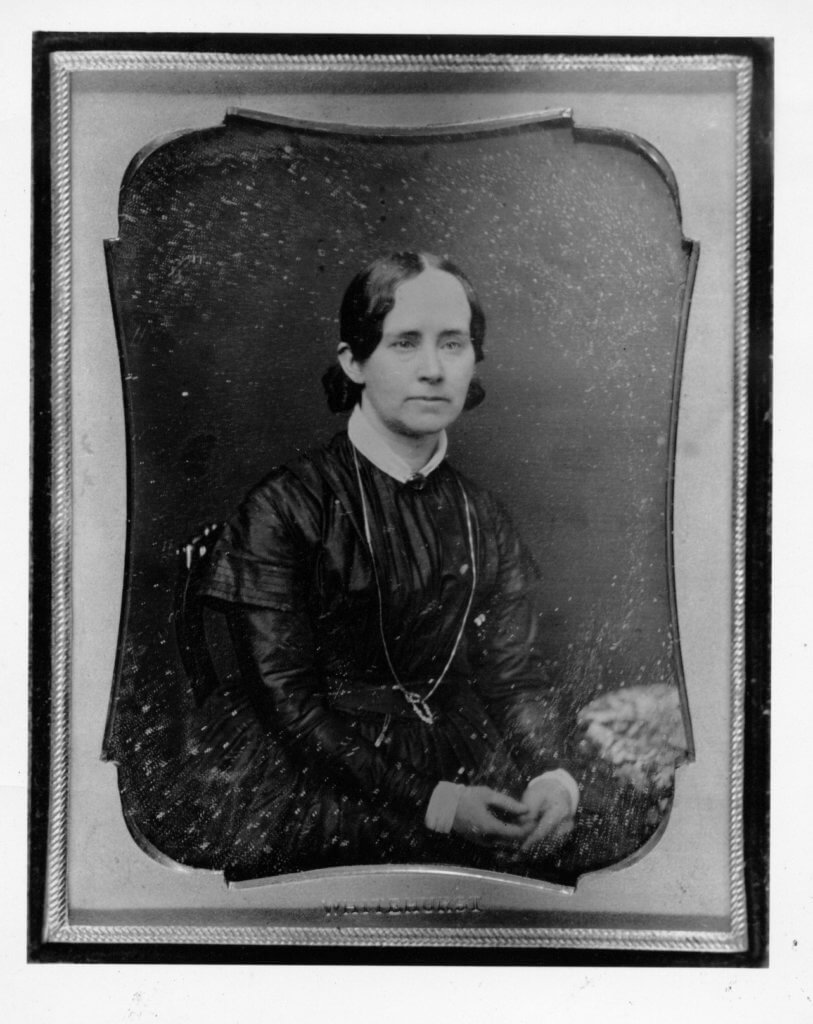
Mary Mann
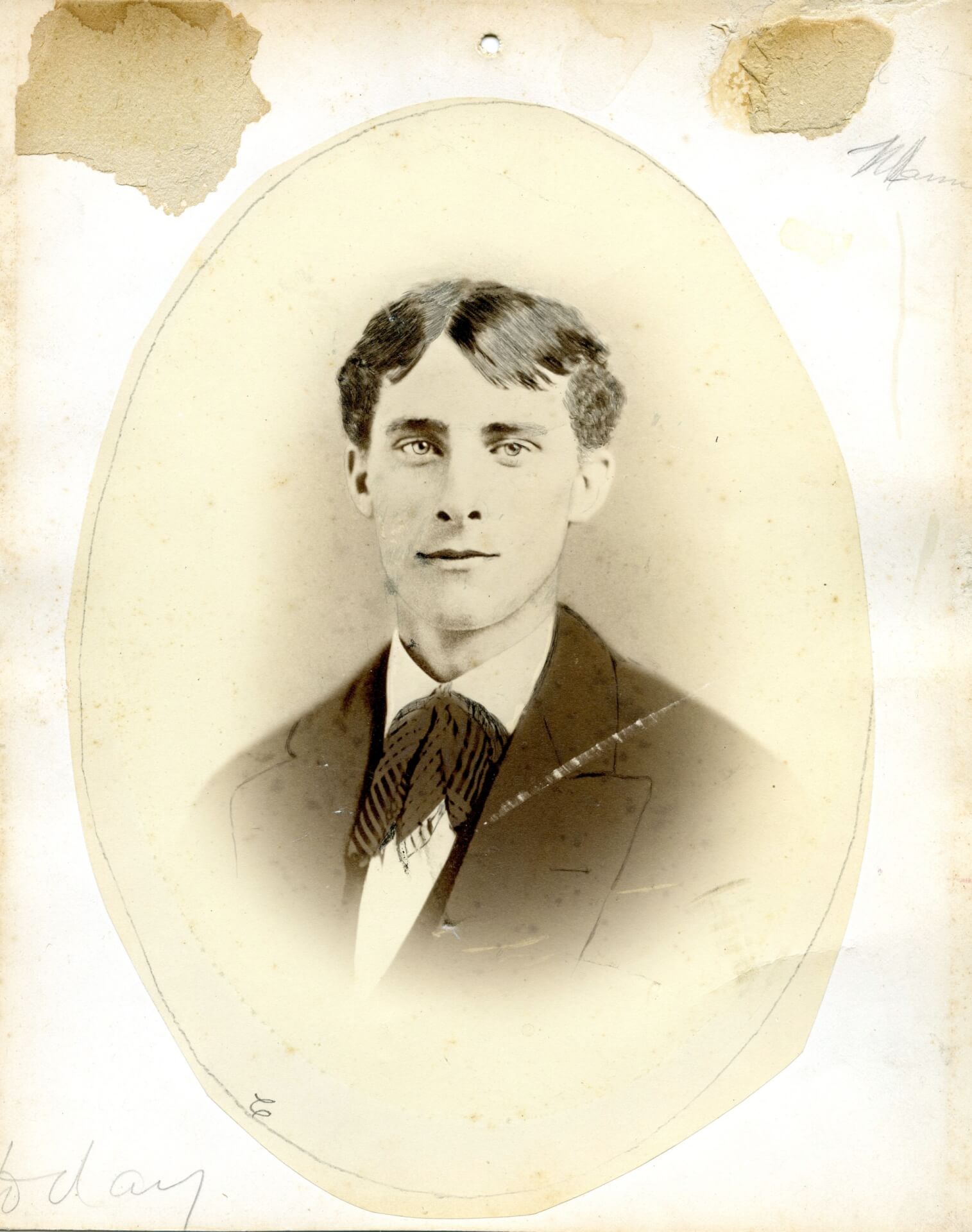
Horace Mann Jr.
“Songs From the Stacks” is a regular selection from Antiochiana: the Antioch College archives by College Archivist Scott Sanders.

